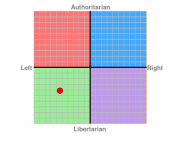- Joined
- Oct 15, 2020
- Messages
- 37,056
- Reaction score
- 18,258
- Location
- Greater Boston Area
- Gender
- Male
- Political Leaning
- Conservative
I'm trying to get my head around the concept of being "left libertarian." To any an all who consider themselves as such, this is Wiki's top-level definition:
Would you describe this as fairly accurate?
Left-libertarianism,[1][2][3][4][5] also known as egalitarian libertarianism,[6][7] left-wing libertarianism[8] or social libertarianism,[9] is a political philosophy and type of libertarianism that stresses both individual freedom and social equality. Left-libertarianism represents several related yet distinct approaches to political and social theory. In its classical usage, it refers to anti-authoritarian varieties of left-wing politics such as anarchism, especially social anarchism,[10] whose adherents simply call it libertarianism.[11] In the United States, it represents the left-wing of the libertarian movement[10] and the political positions associated with academic philosophers Hillel Steiner, Philippe Van Parijs and Peter Vallentyne that combine self-ownership with an egalitarian approach to natural resources.[10][12] This is done to distinguish libertarian views on the nature of property and capital, usually along left–right or socialist–capitalist lines.[13]
While maintaining full respect for personal property, socialist left-libertarians are opposed to capitalism and the private ownership of the means of production.[14][15][16][17] Other left-libertarians are skeptical of, or fully against, private ownership of natural resources, arguing in contrast to right-libertarians that neither claiming nor mixing one's labor with natural resources is enough to generate full private property rights and maintain that natural resources should be held in an egalitarian manner, either unowned or owned collectively.[18] Those left-libertarians who are more lenient towards private property support different property norms and theories such as usufruct,[19] or under the condition that recompense is offered to the local or even global community such as the Steiner–Vallentyne school.[20][21]
Left-wing market anarchism (or market-oriented left-libertarianism), including Pierre-Joseph Proudhon's mutualism and Samuel Konkin III's agorism, appeals to left-wing concerns such as class, egalitarianism, environmentalism, gender, immigration and sexuality within the paradigm of free-market anti-capitalism.[10][22] Although libertarianism in the United States has become associated to classical liberalism and minarchism, with right-libertarianism being more known than left-libertarianism,[5] political usage of the term until then was associated exclusively with anti-capitalism, libertarian socialism and social anarchism and in most parts of the world such an association still predominates.[10][23]
Would you describe this as fairly accurate?


